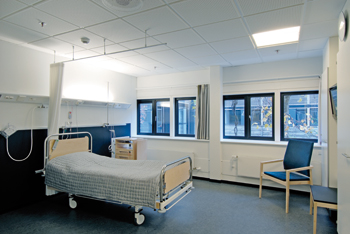Knauf Danoline is the healthy choice
01 September 2014
KNAUF Danoline has been contributing to the acoustic and indoor comfort of patients and medical staff at hospitals around the world for decades, thanks to its extensive range of high quality acoustic materials.
From Bristol Hospital in England, UFR Medical Centre in France and Hamlet Private Hospital in Denmark to Sidra hospital in Qatar, the company’s ceiling systems are chosen for their long service life, excellent acoustics, high design value and certified health-friendly properties, says Kim Christensen, general manager of Danogips Middle East, Knauf Danoline’s subsidiary in Dubai, UAE.
Elaborating on the reason why customers prefer Knauf Danoline ceilings in hospitals, he says: “For architects, the brightness created by our matt finish along with the wide design choices are among the most important factors. They enable the architects to create a calm and airy atmosphere in all corners of a hospital. As for the hospital management, the ease of cleaning and the robustness of the ceilings are key reasons for choosing Knauf Danoline ceilings.”
“However, above all, the decisive factor to both architects and hospital management is the fact that Knauf Danoline materials are certified by accredited laboratories and meet the necessary building code requirements in terms of hygiene, indoor air quality, acoustics and fire safety,” he adds.
Manufactured from natural material that do not pose any health risk, all Knauf Danoline products rate in the highest class in the voluntary labelling system – Danish Indoor Climate Labelling, which tests products for particle emission and degassing in their service phase.
 |
|
|
Adding to the clean air properties is the fact that the ceilings have a built-in Cleaneo technology that helps purify the air by eliminating the air pollutants emitted by other materials in the room, Christensen
points out.
A large number of ceilings systems in the Knauf Danoline product range is especially developed for the various hospital rooms.
Highlighting a few of these applications, Danogips Middle East’s head of sales and marketing Rajeev Menon says: “For rooms with strict infection control and cleaning requirements, we offer our clean-room certified solution, classified as ISO-5 hygiene ceiling according to ISO 14644-1 and ASTM 209-1. For corridors requiring easy access to the cavity, we have special self-supporting ceilings that enable effortless demounting of ceiling tiles without any disturbance of the daily activities of the medical staff. And our most recent product – Contur Unity 3 – represents an ideal solution for ward rooms, thanks to its monolithic surface with excellent Class B sound absorption and the full access provided to the cavity.”
In addition to the numerous special-purpose ceilings, the Knauf Danoline portfolio offers an equally large number of design options when it comes to perforation designs, colours, shapes and even digital printing on the surface of the tiles.
“The fundamental principle of our R&D (research and development) and production processes is to keep developing products that create a healthy and comfortable environment for the end-users and have an environmentally responsible profile. Thus, our production is ISO 14001 accredited for environmental management and all our products provide Leed (Leadership in Energy and Environmental Design) credit opportunities for a sustainable building,” says Biren Parpia, specifications manager at Danogips Middle East.
- Floors and Decks opens new concept showroom
- Turkey gears up for major furniture fair
- AMI set to showcase its portfolio at Big 5
- Blue Stream takes lead with green containers
- Wacker expands Vinnapas range
- Knauf Danoline is the healthy choice



